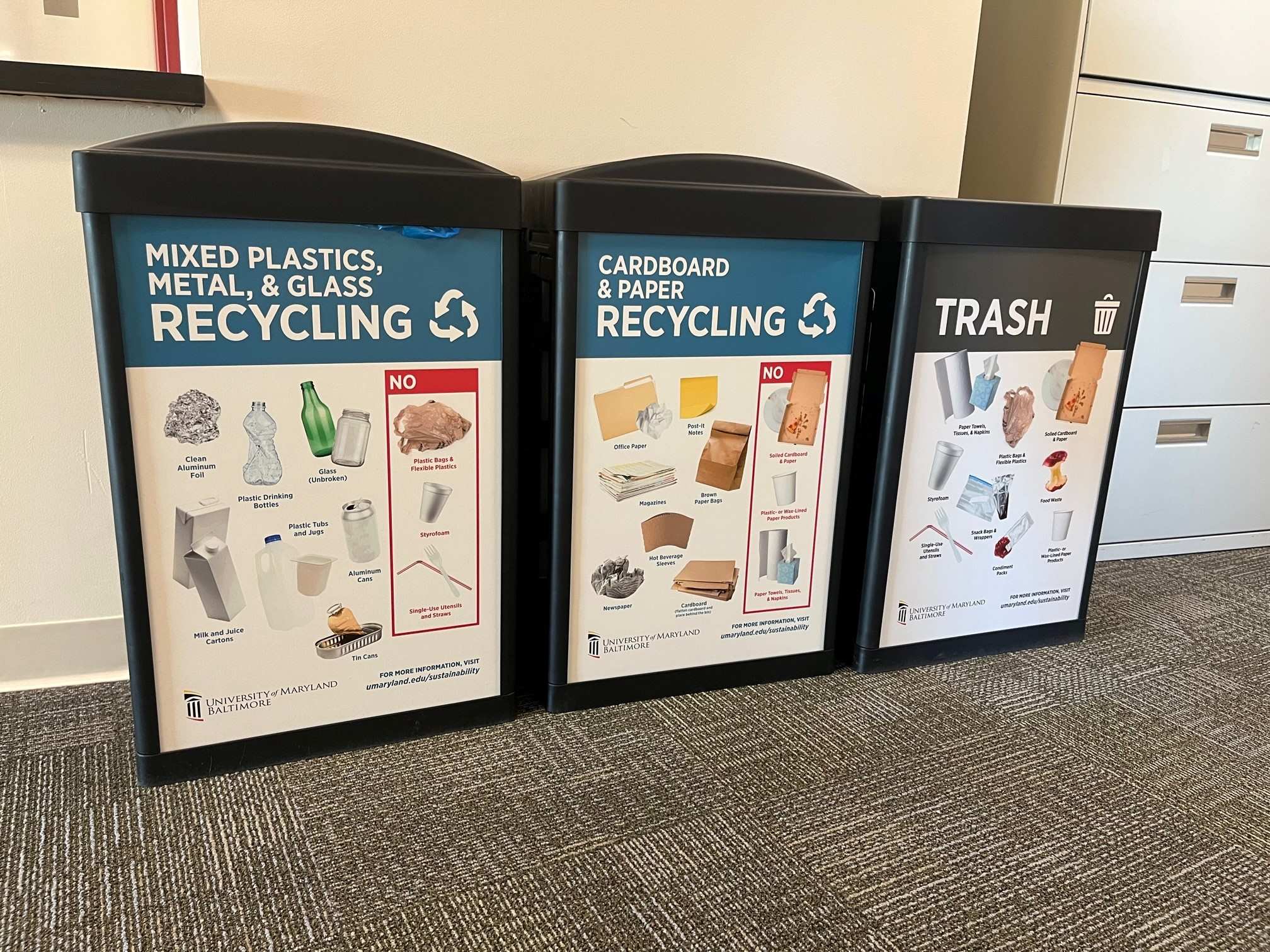Self-Service Waste Initiative Rollout Completed
February 26, 2024 Meredith DiIoia
All 36 buildings have been completed and now have centralized waste stations with consistent waste signage.
The University of Maryland, Baltimore’s (UMB) Office of Sustainability and Environmental Services (EVS) have completed rolling out a self-service waste initiative across campus.
As of Jan. 24, 2024, all 36 UMB-owned and -operated buildings have been completed. Under this system for waste collection, individual desk-side bins were removed, and faculty and staff are responsible for bringing their waste to centrally located receptacles. In office spaces, these stations consist of three bins — trash; cardboard and paper recycling; and mixed plastics, metal, and glass recycling. In applicable lab and clinical spaces, these stations consist of two bins — trash and mixed recycling.
UMB has implemented this program due to research showing that centralized waste stations decrease waste stream contamination by encouraging people to use clearly labeled, centralized bins. This updated system is estimated to reduce the number of individual can liners by 775,170 annually. Plastic liners take around 300 years to fully disintegrate and release toxic particulate matter as they decompose. This program also will help reduce the amount of trash incinerated each year. In 2022, UMB incinerated 1,387 tons of solid waste, which is over 2.5 million pounds, equal to the weight of 231 elephants.
“I think that the School of Pharmacy occupants in Pharmacy Hall, Pharmacy Learning Center, HSRFII, and Saratoga have acclimated well to the new waste stream receptacles,” said Pam Crowe, MS, director of facilities and laboratory services for the school. “They don’t just bring their waste to the closest receptacle; there are always three receptacles to choose from, so it keeps them honest. I believe that this modification in behavior in the workplace impacts how folks think about their own sustainability practices in their personal lives at home.”
The rollout of this new waste model is a crucial component for UMB to meet the multiple recycling and waste goals set by the University and by the state of Maryland. These goals include increasing UMB’s recycling rate by 35 percent by 2025 and reducing overall waste disposal by 10 percent. In 2021, UMB achieved a 19 percent recycling rate.
Not only does this program have a positive impact on the environment, but it also helps our EVS custodial staff members by allowing them to reallocate their time to focus on other tasks to keep our campus clean and safe. This program also prevents EVS staff from having to bend frequently to empty individual cans. Finally, the program provides individual occupants with the health benefit of taking a quick break from their work to walk their waste to the nearest waste station.
“I am so glad the self-service waste management system has been implemented campuswide" said Lorrie Voytek, assistant director of stewardship and donor relations at the University of Maryland School of Nursing. “It will further our mission to create and maintain the conditions that add to a healthy environment for students, faculty and staff."
The self-service waste model is in alignment with all four sets of UMB’s core values:
Respect and Integrity
We value each other and hold ourselves accountable for acting ethically and transparently using compassion and empathy.
-
Respecting all our UMB staff members and their time.
-
Holding ourselves accountable for the waste we generate on campus — the more awareness around the trash individuals generate, the more likely we will look for opportunities to reduce that waste through thoughtful procurement practices and habit changes.
Well-Being and Sustainability
We care about the welfare of our people, planet, communities, and University.
-
Protecting the health of our custodial staff and office staff by reducing the number of touch points EVS staff encounter.
-
Encouraging healthy habits by having occupants take a quick break to stand and walk to a central location from their office to dispose of waste.
-
Reducing pest issues — fewer locations create fewer hot spots for rodents, fruit flies, ants, and other pests.
-
Reducing our waste — fewer liners for individual trash bins means less nonrecyclable plastic film waste sent to the incinerator.
Equity and Justice
We embrace and are committed to diversity, and we value inclusive and just communities. We oppose racism and oppression in all their forms.
-
Understanding we have a role in how our waste gets disposed of — this is everyone’s job.
-
Reducing the amount of trash we send to the incinerator, which is an environmental justice concern — incineration is attributed to air pollution and other public health concerns that disproportionately affect lower-income Baltimore City communities.
Innovation and Discovery
We imagine and explore new and improved ways to accomplish our mission of education, research, clinical care, and service.
-
Committing above and beyond our waste reduction efforts on campus by looking at waste in a holistic way.
-
Creating efficiencies in our waste disposal methods to ensure our buildings are run smoothly and UMB custodial staff can use their time effectively.
More information on the self-service waste initiative, including copies of the new standard waste signage, can be found on the Environmental Services website. For a short educational video about the initiative, visit the UMB Office of Sustainability’s Instagram. Finally, the Office of Sustainability can provide a presentation or training session about waste management and recycling on campus to your department, student organization, or any other group. Please reach out to sustainability@umaryland.edu to set up a session.
Thank you to everyone for demonstrating the core values as we completed the waste rollout. Your participation in this new system will be crucial to meeting our sustainability goals.